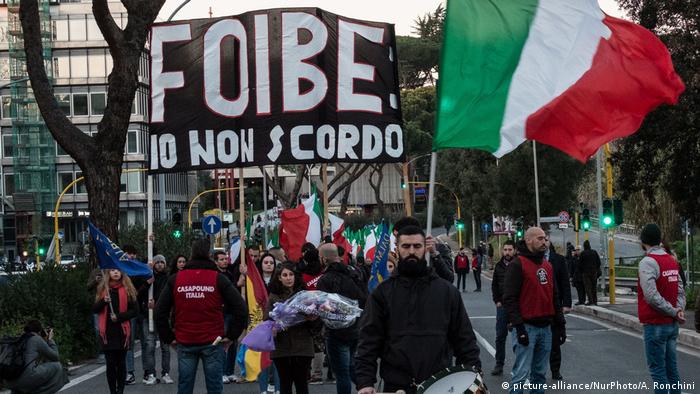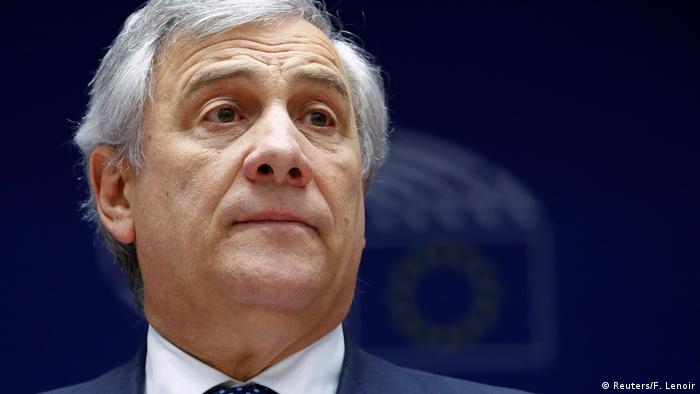The crimes of the partisans in the Second world war between Slovenia and Croatia controversial. Now, the statements of Italy’s top politicians, Antonio Tajani, in both countries, have triggered an Outcry.

“Long live Trieste. It is the Italian Istria, long live the Italian Dalmatia live.” This statement by the Italian EU Parliament President Antonio Tajani is just for excitement in Croatia and Slovenia.
No wonder: while Trieste is a Northern Italian town on the border with Slovenia, belonged to the two holiday regions after the Second world war, socialist Yugoslavia. Today the former Yugoslav republics of Slovenia and Croatia, parts of Istria. Dalmatia is part of Croatia.
Tajani went even further: His controversial Comments from Sunday were part of a speech at the memorial ceremony for the victims of the so-called Foibe-massacre (1943-1945). Foiba referred to the karst caves along the Adriatic coast – where Yugoslav partisans five threw to ten thousand, out of revenge killed Italians from Istria and Dalmatia. Tajani spoke of “thousands of innocent Victims who were killed because they were Italians”. The Italian Vice-Premier Matteo Salvini of the right-wing Lega compared with the same commemoration of the Foibe-dead even with the Victims of Auschwitz.
A half-hearted apology
The theme cares for a number of years for tensions between EU members, Italy, Slovenia and Croatia. The official reading in Rome is that the Foibe-massacres not only wild acts of revenge, but also a systematic ethnic cleansing were compared to the Italian minority. This Interpretation is criticized in Ljubljana and Zagreb focus, although Slovenia and Croatia have taken over the Yugoslav obligations for compensation payments to displaced Italians.

Auschwitz-comparison: Italy’s Prime Minister Matteo Salvini on the day of remembrance of the Foibe massacre
But now the verbal “annexation” seems to bring in Istria and Dalmatia by Tajani, the last straw. Especially as the population had suffered from both regions in the Second world war under the fascist Italian occupation until it was liberated by the partisans.
It is a matter of “unprecedented historical revisionism,” said the Slovenian Prime Minister Marjan Šarec. His Croatian colleague Andrej Plenković want to have recognized in Tajanis words, except revisionism “traces of territorial claims”.
The Slovenian-Croatian shoulder-to-shoulder even with the disagreements between the two countries in the Background – you have been arguing about the demarcation of the Maritime border in the Adriatic Bay of Piran.
Tajani has apologized now. Him do it sorry if someone feel hurt, let the President of the EU Parliament to explain. The friendship of three EU countries was strong. He repeated his statement, however, largely, according to which the massacre of the Italians on the “ideological and ethnic” hate-based. Tajanis as a half-hearted feeling of the outrage could not stop rowing.
Rhetorical Balancing Act
“These statements are a serious blow to the European idea and the Cohesion,” said the former Croatian President Ivo Josipović to the DW. He had participated in 2010, together with the presidents of Slovenia and Italy in Trieste to a celebratory “concert of reconciliation”. Now the quiet times are over for the time being.

All The European Election Campaign? President of the European Parliament Antonio Tajani
In Salvini’s Auschwitz made comparison much less for amazement as the sharp statements by Antonio Tajani, as the European politicians has been perceived as rather moderate. One reason for the swing could be that the European elections are coming up and also Tajanis Forza Italia in the election campaign, and not cut off in the polls.
The social Democrat, Ivo Josipovic sees the rhetorical intensification in the context of the “General strengthening of the radical Right in Europe, historical revisionism, and of the coquetry with various forms of fascism”. His home country of Croatia have a Problem.
In Zagreb, the Croatian victims of the acts of revenge are referred to Communist partisans, until today, largely as Innocent, although many have collaborated with the fascist ustasha Regime. From the state budget a number of books and movies are co-financed by the Croatian death camp Jasenovac represent as a mere labor camp, and the number of the killed Serbs, Roma, Jews, and opponents of the regime expected to be small.
In the current dispute with Italy, which means a considerable balancing act: on the one Hand, the Tito Regime of the later of Yugoslavia (which included many of the former partisans) is considered to be oppressive. If on the other hand, the crimes of the Italians, is the old doctrine: Yes, we have committed crimes, but systematic crimes.